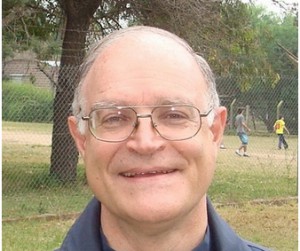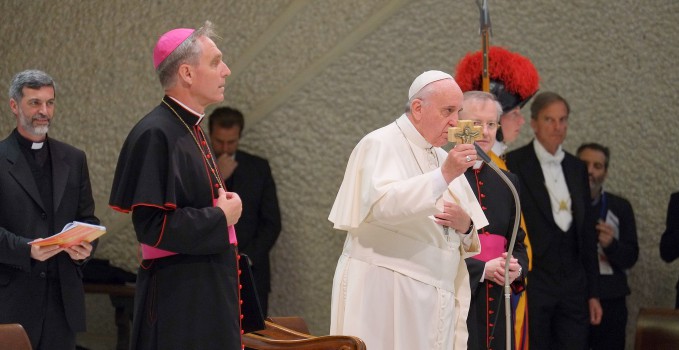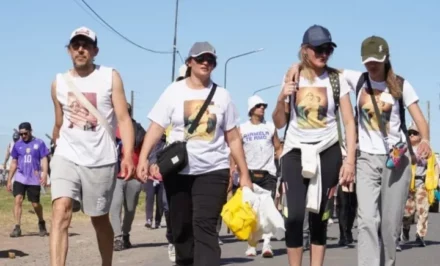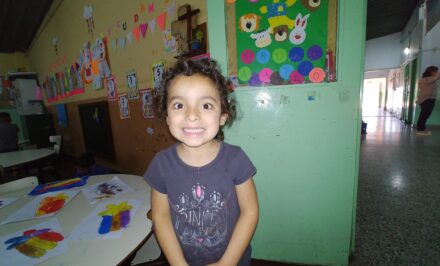VATICAN, VIS/M. Fischer •
Contemplation, service, fraternity – three aspects of priestly life that Pope Francis proposed to the participants in the general chapter of the Schoenstatt Fathers. The new Superior General, Fr. Juan Pablo Catoggio – whom the Holy Fathers knows personally and very well from Buenos Aires – along with the members of the General Chapter were received in audience by the Holy Father, Pope Francis on Thursday 3 September.
At the end of the meeting the Pope gave three recommendations to the Schoenstatt priests. “Firstly, accompany and care for families, so that they are able to live the holy covenant of love and life, especially those who experience moments of crisis or difficulty. Secondly, and thinking of the upcoming jubilee of mercy, dedicate plenty of time to the Sacrament of Reconciliation. Be great forgivers. … May you be witnesses of God’s mercy and tenderness in your communities. And thirdly, pray for me, as I need your prayers”, he concluded.
!Photos of the audience – by Osservatore Romano – at the Vatican Website
Below is the English translation of Pope Francis’ address adapted from Zenit News Agency
Dear Brother Priests,
I am happy to be with you at this meeting, and I thank Juan Pablo for his words, as well as the testimony of affection in the name of the members of the Movement. I also still keep alive last year’s meeting.
The 5th General Chapter that you have just held took place on the 50th anniversary of the foundation of the Institute by Father Joseph Kentenich. Through the years you have taken care to keep alive the foundational charism and have been able to transmit it to the younger ones. I also want you to maintain the charism and transmit it, so that it will continue to inspire and support your lives and your mission. You know that a charism is not a museum piece, which remains intact in a showcase, to be contemplated and nothing more. Fidelity, to keep the charism pure, in no way means to shut it in a sealed bottle, as if it were distilled water, so that it is not contaminated by the outside. No, the charism is not preserved by keeping it put away. It must be opened and allowed to go out, so that it enters into contact with reality, with people, with their anxieties and problems. In this fertile encounter with reality, the charism grows, is renewed and reality is also transformed; transfigured by the spiritual force that the charism holds.
Father Kentenich expressed it very well when he said that one had to have “an ear in God’s heart and a hand on the pulse of the time.” These are the two pillars of an authentic spiritual life.
On one hand, contact with God; He has the primacy, He loves us first, before we think it, He has already preceded us with his immense love. And Saint Paul warns us not to attribute anything to ourselves, as if it were our own, but that our capacity comes to us from God (cf. 2 Corinthians 3:4-6). In the reading of today’s Divine Office today, Saint Gregory the Great speaks to us of the priest who is a watchman on the heights in the midst of the people so that he can see what is coming from a distance (cf. Homily in Ezekiel, Book 1, 11, 4). It is the same with the priest. I am referring to the priest who is awake, because the one who is asleep sees nothing, no matter how high up he is. As the rest of his brothers, he is also in the grasslands of his weakness, of his little strength. However, the Lord calls him so that he will arise, so that he will go up to the watchtower of prayer, to the height of God. God calls him to enter into dialogue with him: a dialogue of love, of a father with a son, of a brother with a brother, a dialogue in which the beating of God’s heart can be heard and one learns to see further, more profoundly. And I have always been impressed by the figure of Moses, who was in the mist of the people, in the midst of rows, of fights with Pharaoh, with grave problems to be resolved. Like when he was on the sea shore and saw Pharaoh’s army coming: “What do I do now?” A man whom God was calling to be a watchman. He led him on high and spoke with him face to face. What a giant! — we would have said. And what does the Bible say: he was the humblest man on earth. There was no man as humble as Moses. When we allow ourselves to go up to the watchtower of prayer, to intimacy with God to serve our brethren, humility is the sign. I don’t know; measure yourselves against this. In contrast, when we are “little roosters,” more or less sufficient, it is because we are half way or think that we can manage.
The Lord awaits us in prayer — please, do not leave it – in contemplation of His Word, in the praying of the Liturgy of the Hours. It is not good to neglect prayer or, worse yet, to abandon it with the excuse of an absorbing ministry, because “if the Lord does not build the house, in vain do its builders labor” (Psalm 127:1) It would be a grave error to think that the charism is kept alive by concentrating on external structures, on schemes, on methods, on the form. God keep us from the spirit of functionalism! The vitality of the charism is rooted in the “first love” (cf. Revelation 2:4). In the second chapter of Jeremiah we read: “I remember the years of your youth, when you followed me happy through the desert.” The first love, to return to the first love. That first love renewed day by day, in the willingness to listen and respond with enamoured generosity, in contemplation, opening ourselves to the novelty of the Spirit, to surprises, as you said. This healthy and necessary decentralization happens when we put ourselves aside, so that Christ can occupy the center of our life. Please, be de-centralized; never be at the center.
The second pillar is constituted by the expression: “take the pulse of the time,” of reality, of persons. Do not be afraid of reality, and reality must be taken as it comes, like the goalkeeper when the ball is kicked from there, from there, from where it comes, tries to intercept it. The Lord waits for us there, He communicates and reveals himself to us there. They are not two different ears, one for God and the other for reality. When we meet with our brothers, especially with those who in our eyes or in the eyes of the world are less pleasant, what do we see? Do we realize that God loves them, who have the same flesh that Christ took on or do we remain indifferent to their problems? What is the Lord asking of us in that situation? To take the pulse of reality requires contemplation, a family-like relationship with God, constant prayer, and often boring but which ends in service. In prayer we learn not to look away from Christ who suffers in his brothers. In prayer we learn to serve.
Service, must be the dominant note in the life of a priest! It is not in vain that ours is a ministerial priesthood, at the service of the baptismal priesthood. In practical terms, you are the last reality of the Movement founded by Father Kentenich; and this encloses a great lesson, it is something beautiful. This being the “last” reflects clearly the place that priests occupy in relation to their brothers: the priest is not above or before the rest, but walks with them, loving them with Christ’s love, who did not come to be served but to serve and to give his life as ransom for many (cf. Matthew 20:28). I believe that here, in essence, is what your founder wanted for priests: to selflessly serve the Church, all the communities, the Movement, to maintain its unity and mission. On one hand, the priest must go up to the watchtower of contemplation to enter into God’s heart and, on the other, he must come down — in the Christian life to progress is to lower oneself — to lower himself in service, and to wash, cure and bandage the wounds of his brothers. They have so many moral and spiritual wounds, which keep them lying outside the path of life. Let us ask the Lord to give us shoulders like his, strong to carry those who do not have hope, those who seem to be lost, those that no one ever looks at … and, please, that he may free us from “ladder of promotion” in our priestly life.
It is certainly a demanding task, which can be borne and even beautiful with priestly fraternity. Please, never do so alone. The presbyterial ministry cannot be conceived in an individual way or, worse still, individualist. Fraternity is the great school of discipleship. It implies much giving of oneself to God and to brothers; it helps us to grow in charity and in unity, and makes our life witness more fecund. We are not the ones who choose our brothers, but we are the ones who can make the conscious and fecund choice to love them as they are, with defects and virtues, with limitations and potentialities. Please, may there never be indifference in your communities. Conduct yourselves as men; if disputes or differences of opinion arise, do not worry, the heat of discussion is better than the coldness of indifference, real sepulcher of fraternal charity. In the end, everything is surmounted with love, understanding, dialogue, sincere affection, prayer and penance, and fraternity take on new strength, new impetus, filling your priesthood with joy. Learn to endure one another, to quarrel and forgive each other. Above all, learn to love one another.
Contemplation, service, fraternity, I wanted to share these three aptitudes with you which can be of help in priestly life.
As our meeting draws to an end, allow me to humbly recommend three things. Firstly, support and care for families, they need to be supported, so that they can live their covenant of love and life in holiness, especially experiencing moments of crisis or difficulty. Secondly, and thinking of the forthcoming Jubilee of Mercy, dedicate much time to the Sacrament of Reconciliation. Please, be great forgivers. It does me good to recall a monk in Buenos Aires who is a great forgiver. He is almost my age and sometimes he is gripped by scruples for having forgiven too much. And one day I asked him: “And what do you do when you are gripped by scruples?” – “I go to the chapel, I look at the Tabernacle, and I say: Lord, forgive me, today I forgave too much, but let it be clear that you gave me the bad example.” May you be witnesses of mercy and the tenderness of God in your communities. And, thirdly, I ask you to pray for me, because I need it. I entrust you affectionately to the care of our Thrice Admirable Mother, and may God bless you. Thank you.
Greeting to the Holy Father given by Fr. Juan Pablo Catoggio
 Dear Holy Father, thank you so much for receiving us. It was the desire of the entire Chapter to meet with you. We still vividly recall our meeting with you, as a Schoenstatt Movement on the occasion of the Movement’s centenary on 24 October last year. What you mean to us is very powerful, the impact of your person, your word, your actions, and certainly, your pastoral recommendations. We identify greatly with your vision and message, and we are very drawn to your witness of life. For this, Holy Father, heartfelt thanks.
Dear Holy Father, thank you so much for receiving us. It was the desire of the entire Chapter to meet with you. We still vividly recall our meeting with you, as a Schoenstatt Movement on the occasion of the Movement’s centenary on 24 October last year. What you mean to us is very powerful, the impact of your person, your word, your actions, and certainly, your pastoral recommendations. We identify greatly with your vision and message, and we are very drawn to your witness of life. For this, Holy Father, heartfelt thanks.
We thank you for the many initiatives, such as the Family Synod, the year of consecrated life and the year of mercy that you have called and which has been greatly welcomed among us. We are a very young community, and still small, even though we have houses in 15 countries and look after the Schoenstatt Movement in 30 countries on four continents. We are celebrating 50 years of our founding, in the last part of the council. And we have recently ended the fifth General Chapter. A central theme from the Chapter and its final document is “Schoenstatt that sets out,” taking this expression, which echoes your words and your missionary programme.
You were very much present in our discussions. We want to strive to also be a “Schoenstatt that sets out,” open, that goes out to encounter all men, including the most marginalized and excluded. We want to transmit from the wealth of our charism, inseparably tied to the Blessed Mother’s Schoenstatt Shrine and the Covenant of Love we sealed with her. We feel that we should in a special way be “priests of the shrine” and “priests of the covenant,” and from a strong ministry of shrines, we want to commit ourselves to the edification of a culture of encounter, as you so often emphasize. For us, this culture of encounter means a culture of covenant and attachments. And it is from this perspective that we want to serve the Church, providing assistance so that everyone can increasingly experience Mary as Mother, who welcomes us, transforms us and educates us in love, who makes us more fraternal and invites us to be her instruments at the service of others. With her motherly heart, Mary makes the Church the home and mother of all.
We, therefore, want to give you this small replica of the shrine as a gift and we give you the “key” to the shrine. And with great pleasure we want to invite you to visit “your” shrine if possible on some visit to Germany. Over and over again, we feel that we are not ready for our vocation and mission – if it possible to be ready – and for this reason we desire and implore that the Spirit of God renews us, gives us a contemplative heart, a deep intimacy with Jesus, the always free gift of priestly sanctity. We desire to participate more deeply in the chrism of our Founder, to increasingly become instruments of Mary, more priestly like the heart of the Good Shepherd, better spiritual fathers at the service of our brothers, better teachers of encounter and covenant. We offer this effort as our spiritual gift to you and we offer it to you for your work as the Shepherd of all, as we ask every time we pray.
Photo above: ©Fotografie Felici, Audience 25.10.2014 – Permission for usage at schoenstatt.org














